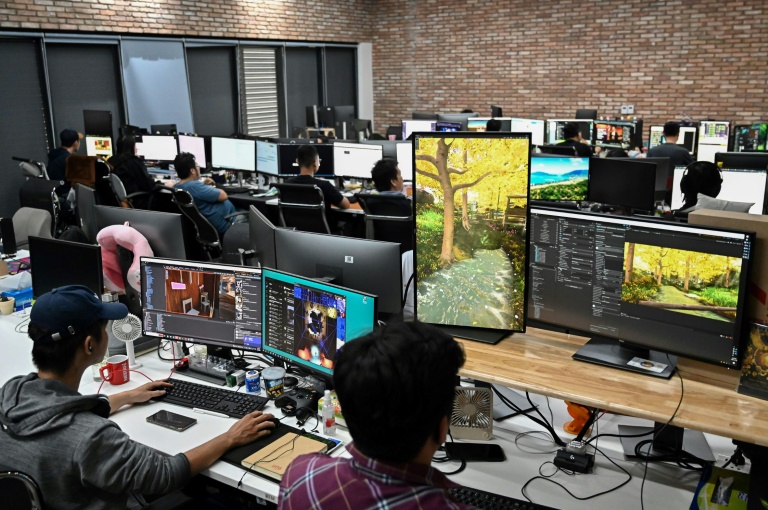VNG co-founder Le Hong Minh’s first taste of international competition was as a gamer for Vietnam at an early e-sport tournament in South Korea.
Two decades later, he says he’s ready to face the world’s best again as he takes his tech company public.
The firm — headquartered in buzzing business hub Ho Chi Minh City — is one of Vietnam’s leading game publishers, but it also runs a digital wallet, cloud services and Vietnam’s most popular messaging platform.
Months after Vietnamese electric vehicle maker VinFast made its debut on the Nasdaq, hitting the headlines around the world as its valuation skyrocketed and then crashed, VNG is also planning a listing in New York.
“I challenge the game team by saying that in the next three to five years we need to become a global game company,” Minh, 46, told AFP from his office on the banks of the Saigon river.
To do that, “we need to be on a global stage, with access to global capital and talent”.
In Vietnam, VNG’s products are already deeply embedded in people’s lives.
Its Zalo app has 75 million active users in a country of 100 million people, outperforming Facebook to make it Vietnam’s most popular messaging platform.
The communist nation has a young and tech-savvy population, but it’s not just them who use Zalo, whose default language is Vietnamese and which is tailored to the domestic market.
“Zalo is very convenient to use for us,” Ha Thi Minh Hoan, 74, told AFP. “As we are old, we stay at home more and we use Zalo for communication. We share photos, chat, have fun with each other.
“If there is no Zalo, life may be a bit boring and monotonous I think.”
– Small beginnings –
VNG was born in 2004 as Vinagame, a start-up with just five people, who prepared the launch of their — and Vietnam’s — first online game by travelling the country on motorcycles.
They plastered posters for the game across 5,000 internet cafes, the founders say.
They have now moved on to fintech and AI, with a mission to show the world what Vietnam — one of the world’s fastest growing economies — and its engineers are capable of.
But games remain a big part of the business plan, with 80 percent of revenue still earned in that division.
Publishing around 10 games a year in Vietnam and in various parts of Southeast Asia including Thailand and Indonesia, they are trying to expand further afield, into Latin America and the Middle East, where they also want to push games they make in-house.
“It is a natural progression,” said Lisa Hanson, CEO of Niko Partners, an Asian games market intelligence firm, noting that Singapore’s Sea, a gaming and e-commerce company, had found success in South Asia and the Middle East with mobile game Free Fire.
Two years before Minh co-founded Vinagame, he travelled from what was then still a poor and underdeveloped Vietnam to play e-sports at one of the first World Cyber Games, held in Daejeon, South Korea in 2002.
“I still remember the emotion. I said to myself this is the pinnacle of my career as a gamer,” he said.
“The ultimate goal of anyone any good is to… play with the best people in the world, right?”
He has that same aim for VNG, he says, which as Vietnam’s first billion-dollar start-up is pitching its “homegrown digital ecosystem” to investors across the globe.
– Challenges ahead –
It’s the right time to do it, said Huy Pham, senior lecturer in finance at RMIT University in Ho Chi Minh City.
“When VinFast made its debut, they really attracted the attention of international investors,” he said.
“So there is growing momentum (with Vietnamese companies) — it’s the best time to get money.”
The firm counts Chinese internet giant Tencent and Singapore state investor Temasek among its shareholders.
But it will need access to serious cash as it makes plans to build a large language model tailored to Vietnam, he added, as well as expand the reach of its games.
The company suffered total losses of $86.7 million in 2022 and $27.4 million in the first six months of 2023, the company said in its filing to the US Securities and Exchange Commission (SEC) in August.
“If they expand to another market that will increase the costs… increase the losses,” Huy said.
And while its messaging platform is doing well, its payment app ZaloPay faces fierce competition from other providers such as Momo and ShopeePay, “some of which have greater financial resources than we do”, VNG’s founders admitted in the SEC filing.
For Minh, after seeing the internet transform the Vietnam of his childhood, it’s time for a new challenge.
“Vietnamese companies have become a lot more capable, and confident,” he said. “We need to look beyond our borders”.

 Business4 months ago
Business4 months ago
 Business5 months ago
Business5 months ago
 Events3 months ago
Events3 months ago
 People4 months ago
People4 months ago
 Events6 months ago
Events6 months ago
















